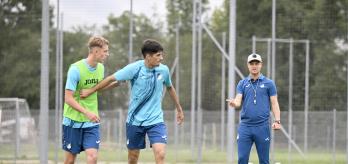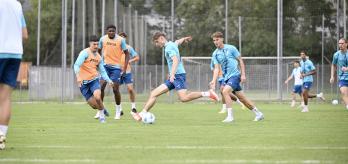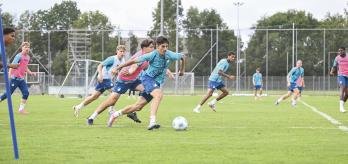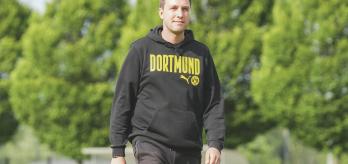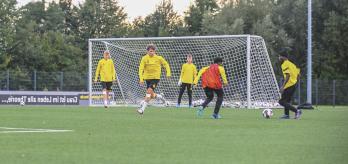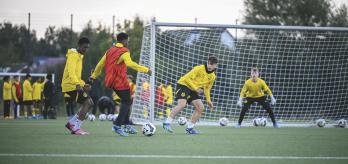Borussia Dortmund’s performance centre is one of Germany’s most successful youth academies. Since 2014, the club’s U17 and U19 teams have each added four German national titles to the club's trophy cabinet. On top of that success and even more importantly, Borussia keep producing talented youngsters and coaches, and bringing them through the ranks to the professional game.
Learning from the tough times
Even the most successful seasons rarely go absolutely according to plan, with your side leading from start to finish. We were no exception: for a while, we certainly couldn’t have predicted that we’d finish the season by winning the German championship and the local youth cup, the Westfalenpokal. Most teams have a “wobble” at some point, and ours came at the beginning of the campaign. On the opening matchday, we lost at home to Bayer Leverkusen (who would go on to be crowned West German champions), despite playing against ten men for 25 minutes. Then we came away with just one point from the next game, against Paderborn.
We shut ourselves away for a week and questioned everything we were doing.
It certainly wasn’t the start to the season we had been hoping for. In hindsight, that start was enormously important for what came afterwards, because after that game, we shut ourselves away for a week and questioned everything we were doing. We asked ourselves what hadn’t worked, and what we needed to change. We came to the conclusion that, for example, we hadn’t shown the intensity we had wanted to on the pitch, not least because we’d been training really hard and that freshness wasn’t there. After that realisation, we started paying even more attention to who was doing well in training, instead of just picking what was supposedly our best 11. At that point, the boys could sense that playing at 95% wasn’t enough to win at this level, and they would have to become a team. Realising all these things allowed us to build the foundation for our success later on.
The keys to success
There is no one factor that will bring you success; it’s always a question of getting everything dialled in at the same time. It was exactly the same with us. After the poor start we had to the season, we drew on the experience we had gathered and had a rethink, which in turn prompted us to change a few things we had been doing in previous years. As we worked together on those changes, it sparked some eureka moments for the coaching staff and the players. Gradually, we started to gel and become a successful side.
Concentrating on our own game
The previous season, we set great store by the way we analysed the opposition. We would watch a lot of games and adapt the way we played accordingly, especially in possession. Last season, we stopped doing that so much, because we realised that our video analysis was taking up too much time and was diverting our attention from training our own players. We limited our in-possession analysis to target areas that were specific to each opponent. The only area where we made detailed tactical tweaks to combat the opposition was our press; it was important for us to make sure we were putting pressure on the ball at all times and engaging in lots of challenges, so we wanted to squeeze the space in the initial phase of the press.
Apart from that, we stuck with our playing style and our system right the way through the season. Instead of tinkering, we came up with some fundamental principles designed to help our players deal with certain situations, like how to build play against a team playing with one, two or three strikers, for instance. The point was to inculcate the belief in our players that we are Borussia Dortmund, this is how we play, and the opposition should be adapting more to us than we are to them. This approach helped us to dominate games a lot more. The fact that we were only making minor changes to the way we played between games meant we became a well-oiled machine; we got to a point where everyone knew what they had to do and when they had to do it. That in turn resulted in a higher share of possession and plenty of goals from a variety of different players.
Intensity is our identity
I gained an insight from a Bundesliga conference that really opened my eyes and changed my way of thinking: it was the fact that most youngsters coming through the ranks struggle with the intensity of the senior professional game. With that in mind, from the beginning of pre-season, I was very clear that I wanted us to gear everything towards playing with as much intensity as we could in every phase of play. And if you want to play that way, you have to train that way, too.
You need to show that emotional investment to get the message across
We made frequent use of small-sided games and exercises, dividing the pitch into multiple different areas and making sure there were plenty of challenges and tackles. We pushed the boys to the limit. Particularly out of possession, we demanded aggression and really high intensity. We also made it clear that we would not tolerate carelessness. You need to show that emotional investment to get the message across – it’s not enough just to use the right drills. In time, that approach became so ingrained in the players that it became normal for them to play like that. It also had the positive side effect of getting the players to a very high level of fitness. That really paid off for us during the season, because we were often able to turn games in our favour after the hour mark.
Team spirit
Cohesion and a strong team ethos are hallmarks of every successful side. We had a particularly big challenge in that respect, because we had players in the squad from different countries and cultures (such as Spain or Italy) who were living away from their parents and didn’t speak German yet, so our aim had to be to turn the team into a family. The key to achieving that is building trust, which we managed to do over the course of many different conversations and meetings. We did an individual analysis of every player who had played at least 45 minutes, and we used those meetings to talk to them about their private lives, too. We instituted a ritual of having breakfast together on the day after a game, and we got the boys to organise and prepare it themselves. The players did a lot of other things together, too, like going for dinners, hiring pedalos or visiting theme parks. Occasionally the coaching staff would come with them, but the point was that the players just wanted to spend time with each other.
A hard-working, diverse coaching staff
For a team to function effectively, you always need a fantastic staff that includes different types of people. We certainly had that. We didn’t always agree on everything, but that was a good thing, because it meant we kept questioning everything. In the end, it was down to me to make the final decision, and when I did, everyone was 100% behind it, and no one got offended. We treated training like a sanctuary and planned every session to the last detail. We planned what we wanted to coach, what size of pitch we wanted to use and which fundamental principles we wanted to work on. We all worked really hard, came together and grew as a team, and sang from the same hymn sheet – all of which helped the players when it mattered.



